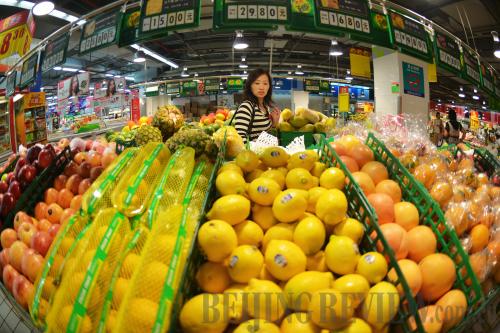|
 |
|
DIFFICULT CHOICE: Fruits line the shelves in a supermarket in Shanghai on June 10 (IC) |
The price for breaking the law will be much higher, according to the amendment.
Producers can face fines of up to 30 times the value of their products, up from 10 times under the current law. If the products are worth less than 10,000 yuan ($1,609), those involved can be fined a maximum of 150,000 yuan ($24,135), up from 50,000 yuan ($8,045) currently.
Meanwhile, consumers can demand reparation worth up to three times of losses they suffer from substandard food. This means that medical expenses incurred at the hands of unsafe food could potentially be paid back to victims threefold. The current law only allows compensation up to 10 times of the food's price at time of purchase.
The bill also adds provisions to punish the landlords of production sites who know that illegal activities are being undertaken on their property, and suppliers who sell unlawful substances to producers, knowing that they will be added to foods. Any illegal income gained in this way will be seized alongside fines up to 200,000 yuan ($32,180).
The draft amendment also proposes that a unified supervision and management system is formed to encompass state- and local-level food and drug administration systems across the country.
Administrative penalties, such as demotion and dismissal, will be imposed on officials who fail to respond to food safety emergencies and remove loopholes. They will also be held responsible for food safety cover-ups. Similar punishments will be dished out to officials with food and drug regulatory agencies, health and agriculture departments.
Employees engaged in testing services who present false reports that result in major food safety incidents, or engaged in related crimes, will face lifetime bans from such work.
"The amendment will impose harsh civil, administrative and criminal penalties on offenders and tough punishments for supervisors who neglect their duties," Xinhua News Agency quoted Zhang Yong, head of CFDA.
Opinions
"The amendment has a well-established framework. It responds to the general public's expectation to get tough on crimes concerning food safety," said Cai Fang, a member of the NPC Standing Committee, at a panel discussion on the bill on June 23.
With a dairy firm and frozen food plant in central China's Henan Province, NPC deputy Zhang Haiqing supported the bill.
"The current law does not have very clear provisions on what kind of offenses should be considered breaking the law. This leaves room for some offenders to talk their way out," said Zhang Haiqing. "By punishing those who break the law, those who abide by it will no doubt benefit as the reputation of the industry and public confidence will improve."
Chen Weiwen, also a member of the NPC Standing Committee, suggests that the law should move further from the production of food to the growth of its ingredients.
"For instance, many dietary supplements use ingredients from medical herbs. The species of the herbs and the environment these herbs grow in will greatly influence the quality and safety of dietary supplements," Chen said.
"The amendment will add teeth to food safety watchdogs but its implementation will not be simple given the rampant tacit consent and agreements within and beyond food producers," said Zheng Fengtian, a professor at Beijing-based Renmin University of China. "Unsafe food producers could potentially work out ways to evade the harsher penalties."
Liu Junhai, Director of the Business Law Center of Renmin University of China who helped draft the amendment, calls on concerned departments to work together and coordinate their supervision of food safety.
"The compensation for the victims of food safety incidents shouldn't have a maximum limit," Liu added. "Even 30 times of the product value is not that much in some cases and it can be higher depending on specific cases."
Email us at: yuanyuan@bjreview.com | 